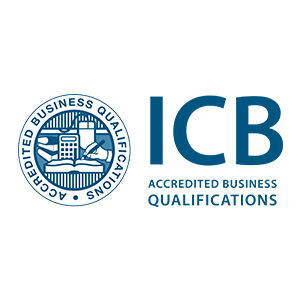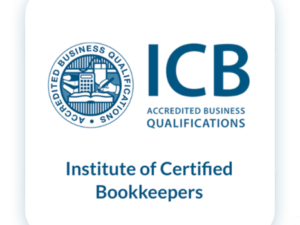Institute of Certified Bookkeepers (ICB)
SACOB is proudly accredited to offer the following QCTO / FASSET Qualifications (previously referred to as the ICB Programmes):
Financial Accounting
Business Management
Students with the above qualifications are recognised worldwide by the Southern African Institute of Business Accountants (SAIBA), the South African Institute of Tax Practitioners (SAIT), the Association of Chartered Certified Accountants (ACCA) and the Chartered Institute of Management Accountants (CIMA).
**For many years, the ICB has been the examining partner and a Quality Assurance Partner (QAP) of the Quality Council for Trades & Occupations (QCTO) for these qualifications. This is currently under review though, which will see a new examining partner being selected.
All students registered with the ICB before the 30th June 2024 will continue to sit their exams with the ICB as the assessment partner. Any new students or students who had started their ICB studies but had not yet registered with the ICB by 30 June 2024, will be required to sit the assessments with the new examining partner.
Related Products
Showing 1–12 of 24 resultsSorted by price: low to high
-
ICB Business Management Advanced Level: Subject – Research Theory and Practice
The RTAP Portfolio of Evidence (P.o. E) is an in-depth research assessment/thesis/ project which will be your primary mark for this subject. This will require significantly more time to complete than the P.o.E for previous subjects. The completed assignment must be uploaded back to MACCI by the P.o.E due date.... more
Bookkeeping / Accounting
 Institute of Certified Bookkeepers (ICB)
Institute of Certified Bookkeepers (ICB)
ICB Business Management Advanced Level: Subject – Research Theory and Practice
-
ICB Financial Accounting Foundation Level: Subject – Business Literacy
This course forms part of the Foundation Level in every ICB Programme, no matter what stream you are studying. It is a unique course, in that both communication and mathematics learning outcomes are covered at the same time. Effective business communication and numeracy is essential for any business practitioner. This course focuses on written and spoken communication as well as numeracy business tools such as fractions, decimal numbers, percentages, ratios, proportions, equations, interest rates and graphs.... more
Administration
 Institute of Certified Bookkeepers (ICB)
Institute of Certified Bookkeepers (ICB)
ICB Financial Accounting Foundation Level: Subject – Business Literacy
-
ICB Business Management & Financial Management Intermediate Level: Subject – Financial Statements
This course forms part of the Intermediate Level in the ICB Financial Accounting, ICB Public Sector Accounting, ICB Business Management and the Entrepreneurship Programme as well at the Advanced Level in the ICB Office Administration Programme. It includes a study of year-end procedures via trading, profit and loss accounts and the interpretation of basic financial statements through a series of ratios, calculations and recordings of depreciation, the disposal of depreciable assets in the journals and general ledger, disclosing the movements of non-current assets in the notes to the financial statements. The application of accounting concepts such as that of accrual, matching prudence, cost and consistency to a set of financial records, preparation of the income statement and balance sheets (with notes) for a sole proprietorship, a partnership, a Close Corporation and a limited company as well as the preparation of the statement of cash flow and applicable notes thereto for a limited company... more
Administration
 Institute of Certified Bookkeepers (ICB)
Institute of Certified Bookkeepers (ICB)
ICB Business Management & Financial Management Intermediate Level: Subject – Financial Statements
-
ICB Office Administration Foundation Level: Subject – Marketing Management and Public Relations
This course forms the Intermediate Level in the ICB Business Management and the ICB Entrepreneurship Programms as well as the Foundation Level in the ICB Office Administration Programme. It looks at how the marketing and public relations functions work together to build a brand for a business. While marketing is interested in the market, consumers and demand, public relations is interested in relationships, reducing conflict and improving cooperation. Good public relations will create a healthy environment for marketing, which, in turn should create healthy profits.... more
Administration
 Institute of Certified Bookkeepers (ICB)
Institute of Certified Bookkeepers (ICB)
ICB Office Administration Foundation Level: Subject – Marketing Management and Public Relations
-
ICB Business Management Intermediate Level: Subject – Office and Legal Practice
This course forms part of the Intermediate Level in both the ICB Entrepreneurship Programme as well as the ICB Business Management Programme. It will take you through the legal procedures and how to apply law principles within a business. As this is a new course offered by the ICB, enrollments and a detailed outline will be available in early 2016.... more
Business Management
 Institute of Certified Bookkeepers (ICB)
Institute of Certified Bookkeepers (ICB)
ICB Business Management Intermediate Level: Subject – Office and Legal Practice
-
ICB Business Management Advanced Level: Subject – Business Management 3
This subject forms part of the Advanced Level in the ICB Business Management Programme. It builds on the knowledge gained in Business Management 1 and Business Management 2 in your Foundation and Intermediate Level.
Business Management
 Institute of Certified Bookkeepers (ICB)
Institute of Certified Bookkeepers (ICB)
ICB Business Management Advanced Level: Subject – Business Management 3
-
ICB Business Management Advanced Level: Subject – Financial Management and Control
This subject forms part of the Advanced Level in both the ICB Entrepreneurship Programme as well as the ICB Business Management Programme. You will gain the knowledge and skills on how to apply managerial finance and control principles in a commercial environment.
Administration
 Institute of Certified Bookkeepers (ICB)
Institute of Certified Bookkeepers (ICB)
ICB Business Management Advanced Level: Subject – Financial Management and Control
-
ICB Financial Accounting Upper Intermediate Level: Subject – Business Law and Accounting Control
This course forms part of both the ICB Financial Accounting and ICB Public Sector Accounting programmes. It completes the skills necessary for an Accounting Technician and includes a study of economics, personal finance, business law, accounting control and liquidation and executors accounts.
Bookkeeping / Accounting
 Institute of Certified Bookkeepers (ICB)
Institute of Certified Bookkeepers (ICB)
ICB Financial Accounting Upper Intermediate Level: Subject – Business Law and Accounting Control
-
ICB Business Management Foundation Level: Subject – Business Management 1
This course forms part of the Foundation Level in the ICB Business Management Programme. It forms the foundation of your business management knowledge and covers the best practices in financial management.
Business Management
 Institute of Certified Bookkeepers (ICB)
Institute of Certified Bookkeepers (ICB)
ICB Business Management Foundation Level: Subject – Business Management 1
-
ICB Business Management Intermediate Level: Subject – Business Management 2
This course forms part of the Intermediate Level in the ICB Business Management Programme. It builds on the knowledge gained in Business Management 1 in your Foundation Level.
Business Management
 Institute of Certified Bookkeepers (ICB)
Institute of Certified Bookkeepers (ICB)
ICB Business Management Intermediate Level: Subject – Business Management 2
-
ICB Financial Accounting Advanced Level: Subject – Corporate Strategy
This course forms part of the Advanced Level of both the ICB Financial Accounting and the ICB Public Sector Accounting Programmes. It aims to redefine corporate strategy to rely less on objectives and competition but rather seeing an organisations big picture that is customer focused, sustainable and successful in the long-term. This course is an in-depth study of strategic management. It shows the impact of corporate strategy on a company's ability to accelerate its sales, gain market leadership, and power up its revenue growth.... more
Bookkeeping / Accounting
 Institute of Certified Bookkeepers (ICB)
Institute of Certified Bookkeepers (ICB)
ICB Financial Accounting Advanced Level: Subject – Corporate Strategy
-
ICB Financial Accounting Intermediate Level: Subject – Cost and Management Accounting
This subject forms part of the ICB Financial Accounting, ICB Public Sector Accounting and the ICB Office Administration Programmes. It will enable a student to perform in a manufacturing environment, be able to complete basic management accounts, have a working knowledge of cost accounting, breakeven analysis, cost-volume-profit analysis, advanced costing, budgeting and standard costing, financial management and business ethics. An understanding of cost and management accounting is essential for any bookkeeper, accountant or office manager.... more
Bookkeeping / Accounting
 Institute of Certified Bookkeepers (ICB)
Institute of Certified Bookkeepers (ICB)
ICB Financial Accounting Intermediate Level: Subject – Cost and Management Accounting